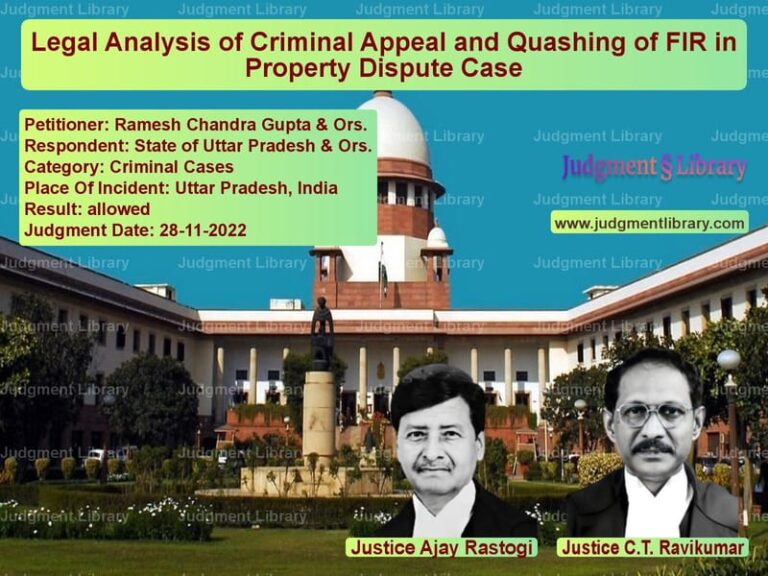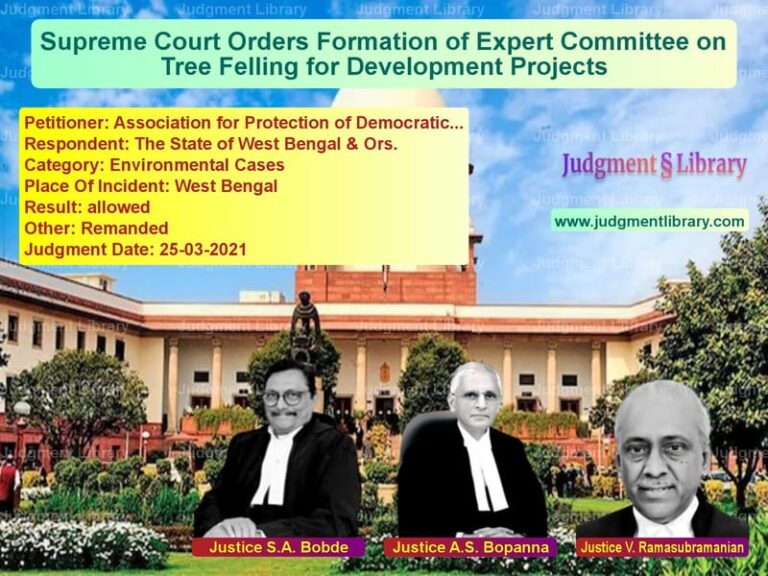Delay in Mercy Petitions: Supreme Court’s Take on Death Sentence Commutation
The Supreme Court of India recently ruled on the matter of delay in disposing of mercy petitions and its impact on the execution of death sentences. The case involved appellants Jasbir Singh alias Jassa and Vikram Singh alias Vicky Walia, who were convicted of serious crimes under Sections 302, 364A, and 201 read with 120-B of the Indian Penal Code. The trial court sentenced them to death, a decision upheld by the Punjab & Haryana High Court and later confirmed by the Supreme Court.
The appellants contended that there was an undue and unexplained delay in processing their mercy petitions, which, under established precedents, entitled them to commutation of their death sentence to life imprisonment. The Division Bench of the Punjab & Haryana High Court dismissed their appeal, holding that intra-court appeals under the Letters Patent were not maintainable in cases involving criminal jurisdiction.
Petitioner’s Arguments
The petitioners argued that their execution should be commuted to life imprisonment because of the excessive and unexplained delay in the consideration of their mercy petitions. They relied on previous judgments, particularly Shatrughan Chauhan & Another v. Union of India & Others, which held that prolonged delays in executing a death sentence constitute cruel and inhuman punishment, thereby violating Article 21 of the Constitution.
Respondent’s Arguments
The State, represented by the Additional Solicitor General, contended that the delay in processing the mercy petitions was not unreasonable and did not meet the threshold established by previous rulings. They argued that the procedures followed were consistent with legal standards and that allowing commutation in this case could set a precedent that disrupts the justice system.
Key Observations by the Supreme Court
The Supreme Court examined the jurisprudence surrounding mercy petitions and delays in execution. The Court acknowledged that while it does not have the jurisdiction to reopen cases on merits, it must ensure that convicts are not subjected to prolonged uncertainty due to administrative delays. The judgment cited paragraph 61 of the Shatrughan Chauhan case:
“Undue, inordinate, and unreasonable delay in execution of a death sentence does certainly attribute to torture, which indeed is in violation of Article 21 and thereby entails as the ground for commutation of sentence.”
The Court further noted that appeals regarding delays in mercy petitions should not be equated with the original criminal trial or appeal process. Instead, they are independent proceedings based on supervening circumstances occurring after the determination of guilt.
Supreme Court’s Verdict
The Supreme Court found that the High Court erred in ruling that Letters Patent Appeals were not maintainable in such cases. The Court observed:
“If a clear-cut distinction is accepted that while dealing with a writ petition based on the ground of delay in disposal of a mercy petition or application for commutation, the Court does not and will not enter into the merits of the matter, the proceedings so initiated by way of writ petition are not connected with the earlier determination of guilt in regular proceedings.”
As a result, the Supreme Court set aside the Punjab & Haryana High Court’s decision and directed the Division Bench to hear the matter afresh. The Court also recommended that in similar cases, High Courts should consider listing such writ petitions before a Division Bench instead of a Single Judge to avoid unnecessary delays.
Implications of the Judgment
- Strengthening Due Process: The ruling underscores the importance of ensuring that procedural delays do not infringe upon fundamental rights.
- Precedent for Future Cases: The judgment affirms that delays in mercy petitions must be examined independently and could be grounds for commutation of a death sentence.
- Judicial Efficiency: The Supreme Court’s suggestion to list such cases before Division Benches in High Courts aims to expedite proceedings and reduce delays in addressing death row appeals.
This decision reinforces the principle that while the death penalty is legally valid in India, it must be executed in a manner that does not violate constitutional protections against cruel and inhuman treatment.
Petitioner Name: Jasbir Singh @ Jassa & Vikram Singh @ Vicky Walia.Respondent Name: State of Punjab & Others.Judgment By: Justice Uday Umesh Lalit, Justice S. Ravindra Bhat, Justice Bela M. Trivedi.Place Of Incident: Punjab.Judgment Date: 09-12-2021.
Don’t miss out on the full details! Download the complete judgment in PDF format below and gain valuable insights instantly!
Download Judgment: jasbir-singh-@-jassa-vs-state-of-punjab-&-ot-supreme-court-of-india-judgment-dated-09-12-2021.pdf
Directly Download Judgment: Directly download this Judgment
See all petitions in Bail and Anticipatory Bail
See all petitions in Custodial Deaths and Police Misconduct
See all petitions in Attempt to Murder Cases
See all petitions in Judgment by Uday Umesh Lalit
See all petitions in Judgment by S Ravindra Bhat
See all petitions in Judgment by Bela M. Trivedi
See all petitions in allowed
See all petitions in Remanded
See all petitions in supreme court of India judgments December 2021
See all petitions in 2021 judgments
See all posts in Criminal Cases Category
See all allowed petitions in Criminal Cases Category
See all Dismissed petitions in Criminal Cases Category
See all partially allowed petitions in Criminal Cases Category







